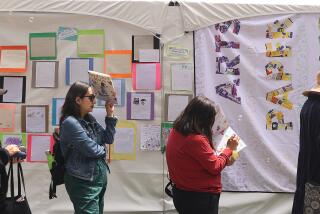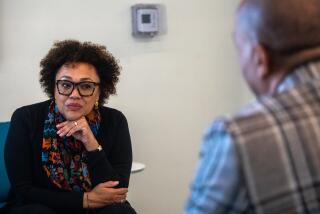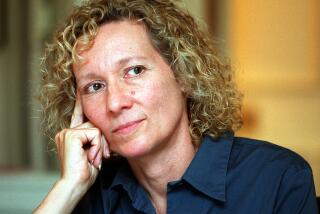Jayne Cortez dies at 78; poet and performance artist
Before the ashes and the anguish, before the 1965 riots and the spotlight of attention that followed, there was a pocket of people already fighting for Watts.
They fought for the arts and for the black community from a building on Grandee Avenue and 104th Street. It was there, in the community she was raised in, that Jayne Cortez founded the Watts Repertory Theater Company, an ensemble she used to unearth and highlight racial inequalities.
Cortez, a performance artist whose evocative, surreal poetry tackled racial and sexual oppression, died Dec. 28 of heart failure at a hospital in New York City, said her husband, Melvin Edwards. She was 78.
Wanda Coleman, long considered L.A.’s unofficial poet laureate, lauded Cortez’s skill as a wordsmith and her tenacity as a trailblazer among female black writers.
“She was the first African American woman I met who refused to give in to negatives and difficulties,” Coleman said this week. “She was an inspiration to me. Those were some mighty high heels, and walking behind them has been an effort.”
In Cortez’s poetry, which was compiled into 10 books, almost nothing was off limits. She wrote explicitly, for instance, about two high-profile sexual assault cases from the 1970s in which the women killed their attackers.
“I use dreams, the subconscious and the real objects, and I open up the body and use organs, and I sink them into words,” Cortez once told an interviewer. “I guess the poetry is like a festival. Everything can be transformed.”
Starting in 1980, she performed and recorded her poetry to the jazz beats of the Firespitters, a band she formed with Denardo Coleman, her son from her first marriage to noted jazz musician Ornette Coleman.
“She’d give me an idea of a flavor of music that she wanted,” her son said. “She didn’t want the poetry to dominate the music. It was all supposed to be one.”
Novelist EJ Priestley, whom Cortez cast and directed in a production of Jean Genet’s “The Blacks” in the 1960s, characterized Cortez’s poetry as a way to demand change.
“She didn’t pull any punches when it came to social equality,” Priestley said this week. “Her spirit was really fiery.”
A section of “Global Inequalities,” a poem she wrote in 1990, reflects that disposition:
The treasury secretary is not going around in circles looking for grain
There’s no desert growing in nose of Supreme commander of justice
It’s somebody else without weight without blood without land without a cloud cover of water on the face
It’s somebody else Always somebody else
She was born Sallie Jayne Richardson in Fort Huachuca, Ariz., on May 10, 1934, her family confirmed. Early in her career, she started using Cortez, her Filipino maternal grandmother’s name.
Her family left Arizona in the early 1940s and eventually settled in a home in Watts. She studied music in high school and liberal arts at what was then Compton Junior College, and also worked in a belt factory and as a waitress. The low-paying jobs influenced her art, she said, as did two summers she spent in mid-’60s Mississippi registering black voters for the Student Nonviolent Coordinating Committee.
The daughter of a career military man and a secretary, Cortez spent her teen years attending jazz jam sessions around the city, some of which are recounted in “Jazz Fan Looks Back,” a 2002 collection of her poetry.
By 1968, she was divorced and living in New York, a place she often wrote about:
i am new york city
here is my brain of hot sauce
my tobacco teeth my
mattress of bedbug tongue
In the mid-’70s she married Edwards, a sculptor who made drawings for many of her books, and started teaching black literature and music at Rutgers University. She co-founded the Organization of Women Writers of Africa in 1991, and split her time between New York and Dakar, Senegal.
In addition to Edwards and her son, she is survived by three stepdaughters, Ana, Margit and Allma Edwards; a sister, Shawn Smith; and two grandchildren.
When Cortez, draped in a red-and-black shawl, performed one of her better-known poems, “Find Your Own Voice,” in 2010 with her son, the words became something of a mantra:
Find your own voice & use it, use your own voice & find it
The sounds of drizzle on dry leaves are not like sounds of insults between pedestrians
Those women laughing in the window do not sound like air conditioners on the brink
The river turtle does not breathe like a slithering boa constrictor
The roar of a bull is not like the cackle of a hyena
The growl of a sea-leopard is not like the teething cry of a baby
The slash of a barracuda is not like the gulp of a leaping whale
The speech of a tiger shark is not like the bark of an eagle-fish
The scent of a gardenia is not like the scent of a tangerine
Find your own voice & use it, use your own voice & find it
More to Read
Start your day right
Sign up for Essential California for the L.A. Times biggest news, features and recommendations in your inbox six days a week.
You may occasionally receive promotional content from the Los Angeles Times.







